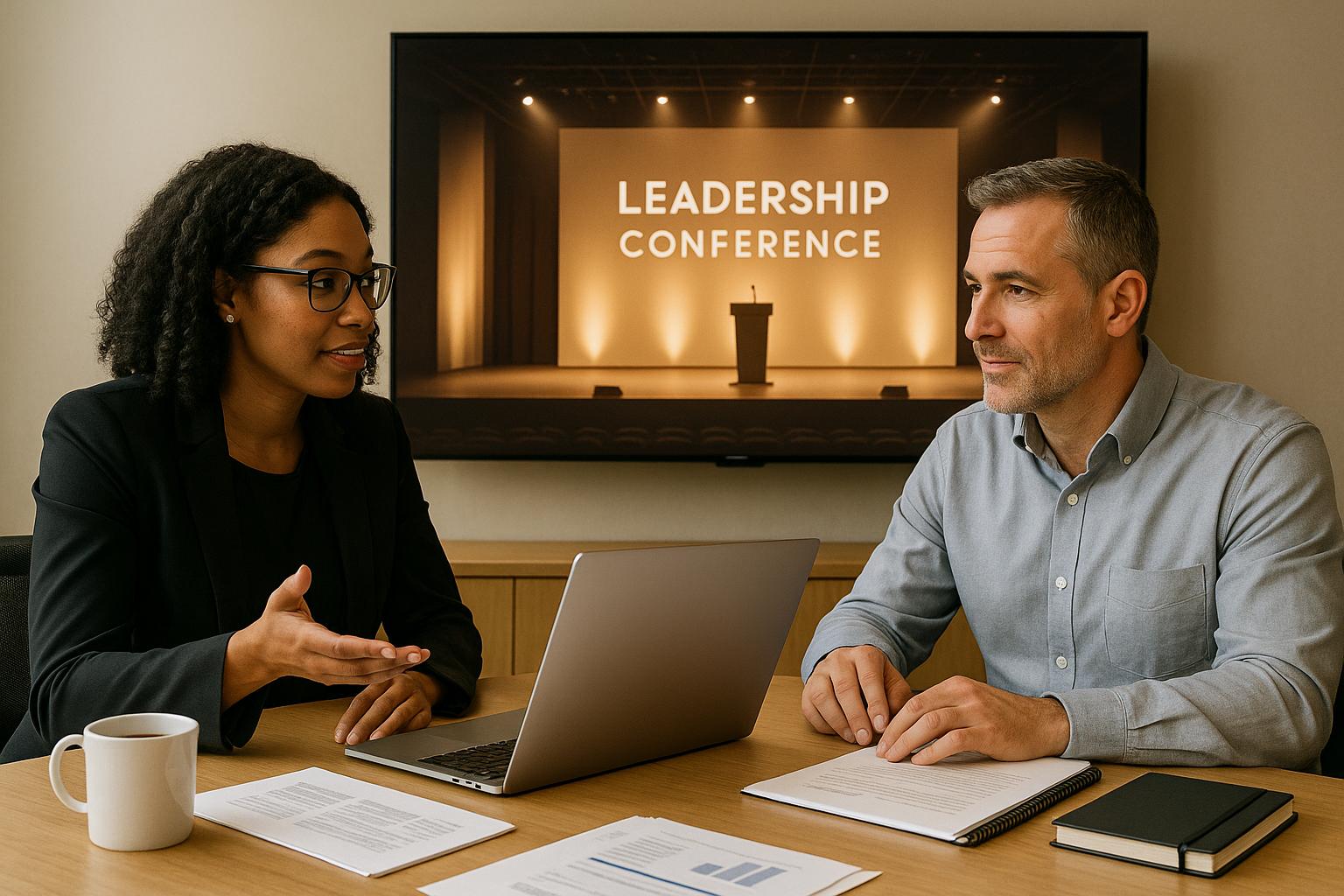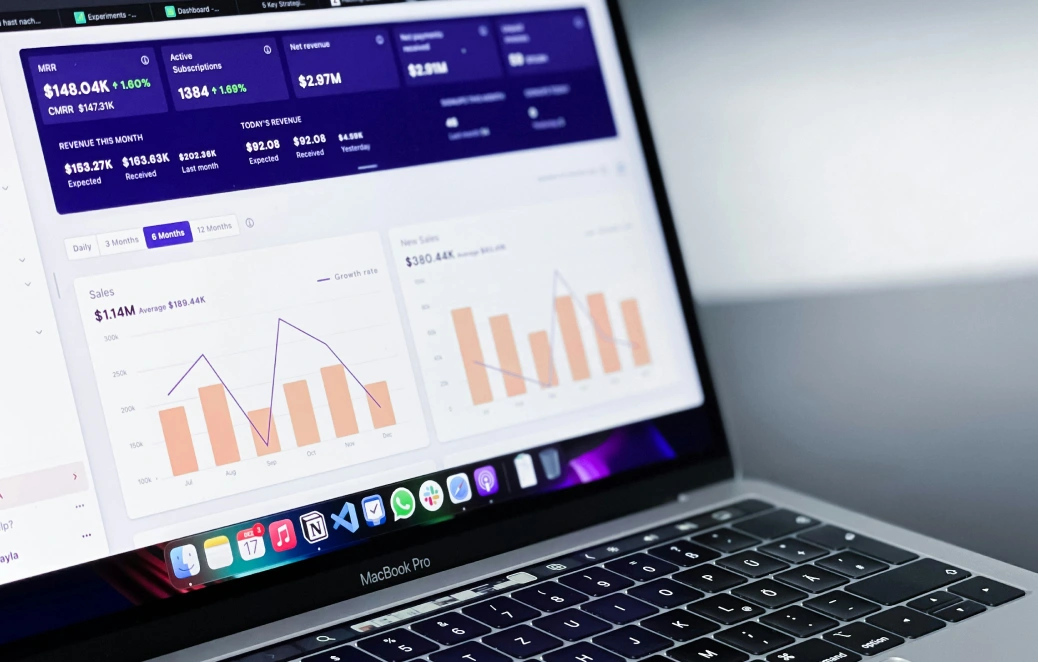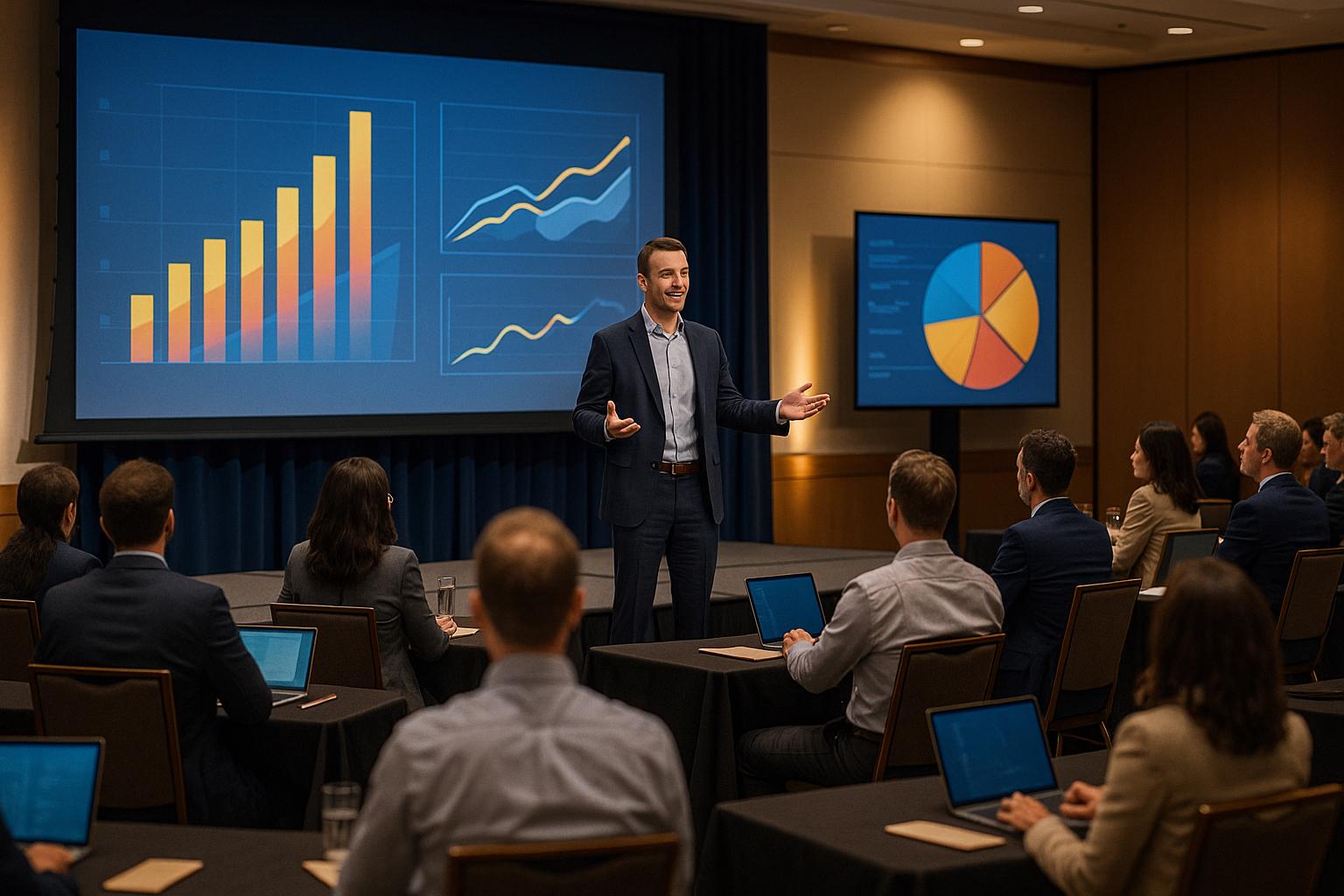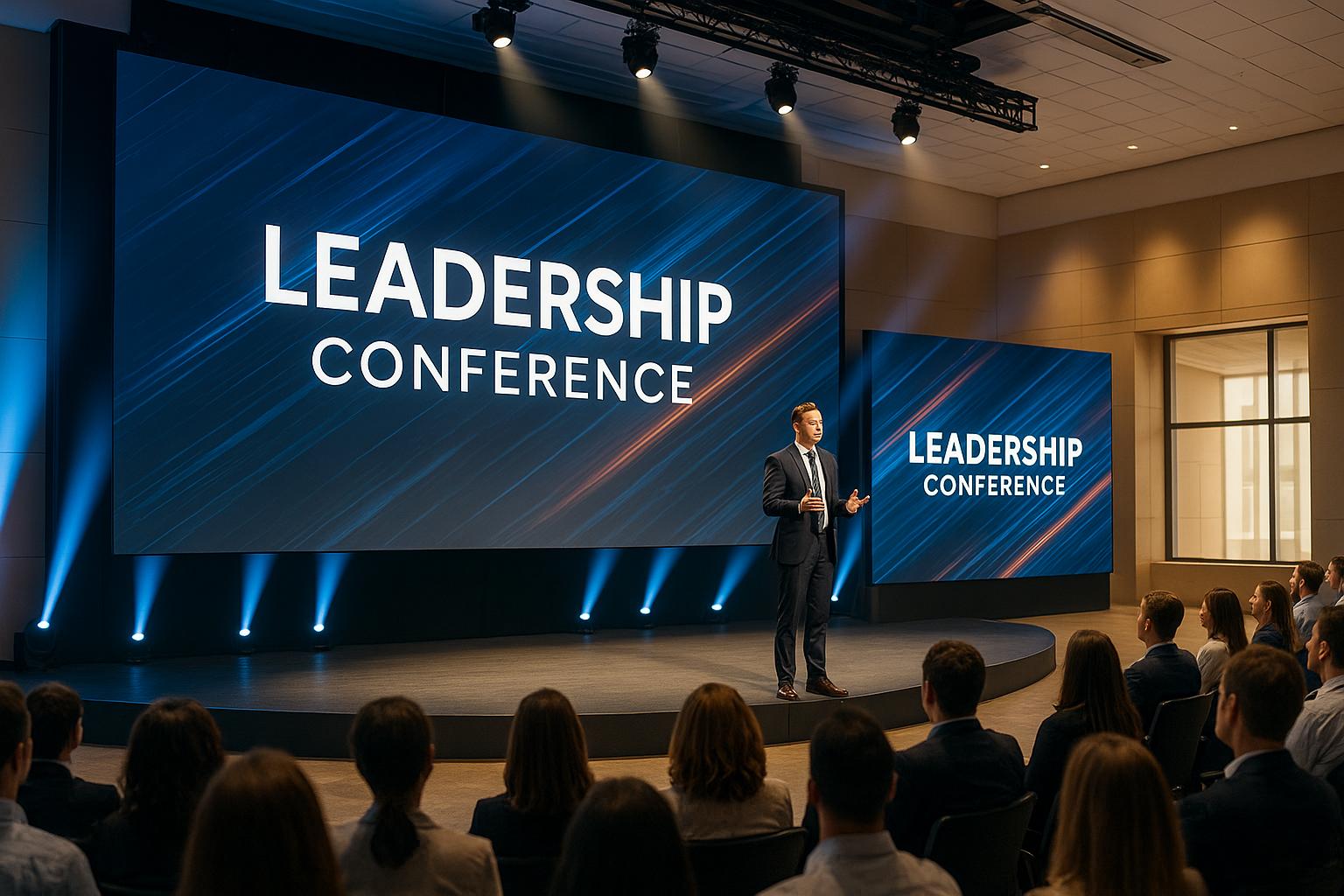How do I Choose a Production Company for a Leadership Conference?

Chief Executive Officer

Choosing the right production company for your leadership conference is crucial for ensuring a smooth, impactful event. Here's how you can make the best choice:
- Define Goals: Identify your objectives (e.g., team building, executive development) to find a company with the right expertise.
- List Features: Prioritize essentials like high-quality audio, professional lighting, live streaming, and interactive tools.
- Check Experience: Look for companies with a proven track record in corporate events of similar scale.
- Review Portfolios: Assess past work, case studies, and client feedback to gauge reliability.
- Evaluate Technical Skills: Ensure they have advanced AV setups, hybrid event capabilities, and strong contingency plans.
- Align Budget: Compare service packages and request detailed, itemized quotes to match your budget.
Key Questions to Ask:
- What leadership conferences have you handled before?
- How do you manage technical issues or last-minute changes?
- Can you provide references and certifications?
How to Source an A/V Vendor for Your Next Event - Part #1: Why & When - Logan Clements
Check Experience in Corporate Event Production
When organizing a leadership conference, the experience of your production company can make or break the event. Companies with a solid background in corporate events understand the unique demands of these gatherings, from managing tight schedules to handling last-minute speaker changes - all while maintaining a polished, professional atmosphere.
Start by focusing on companies that have managed events of a similar scale to yours. Then, dig deeper into their track record by reviewing past projects, client feedback, and relevant certifications to ensure they have the expertise you need.
Review Past Work and Case Studies
A company’s portfolio can tell you a lot about what they bring to the table. Ask for case studies from leadership conferences or corporate events they've recently handled. Pay close attention to the size and complexity of these events to gauge whether they can handle your specific needs.
Look for variety in their portfolio - it’s a good indicator of their adaptability. Whether they’ve worked on small, intimate gatherings or large-scale conferences, understanding the scope of their involvement is key. Did they manage just the audiovisual setup, or did they oversee the entire production from start to finish? These details will help you assess their capabilities.
Read Client Reviews and Contact References
Client reviews are an excellent way to gauge how a production company performs under pressure. Look for feedback that highlights their reliability, communication skills, and ability to solve problems effectively. Reviews from corporate clients are particularly valuable since they often touch on aspects critical to leadership events.
Don’t stop at online reviews - request direct references from clients who’ve hosted similar events. When speaking with these references, ask specific questions: How did the team handle unexpected challenges? Were they able to stick to the budget? Would the client hire them again? If a company hesitates to provide references, that could be a warning sign. These conversations, paired with technical credentials, will give you a clearer picture of their professionalism.
Look for Professional Certifications and Awards
Certifications can signal a company’s dedication to maintaining high standards and staying current with industry trends. For example, the Certified Meeting Professional (CMP) designation from the Events Industry Council is a well-regarded credential that demonstrates expertise in event management.
For companies specializing in corporate events, look for team members with the Certified Special Events Professional (CSEP) designation from the International Live Events Association. This certification reflects a deep understanding of event planning and execution. If your conference includes virtual or hybrid elements, the Digital Event Strategist (DES) certification from PCMA shows expertise in managing these formats.
Awards from respected organizations like the International Live Events Association or Meeting Professionals International are also worth noting. While certifications and awards shouldn’t be the sole deciding factors, they do indicate that the company values professional growth and has earned recognition from industry peers.
Be sure to ask which certifications the team members assigned to your event hold. This ensures you’re working with professionals who are equipped to deliver a seamless experience.
Review Technical and Audiovisual Skills
When it comes to your leadership conference, technical precision isn't just a bonus - it’s a necessity. The quality of your audiovisual (AV) setup directly impacts how clearly speakers are heard, how effectively presentations resonate, and how engaged your audience remains throughout the event.
Technical expertise involves more than just equipment - it’s about seamlessly integrating all AV elements. The best production teams know how to make lighting, sound, and visuals work together to create an environment that aligns with your conference goals. They’ll adjust lighting to suit both in-person attendees and cameras, manage audio sources without feedback, and ensure smooth transitions between sessions, leaving no room for distractions.
Check AV Equipment Quality and Services
Leadership conferences often require sophisticated AV setups to accommodate presentations, multiple speakers, and interactive features. A key question to ask: Does the production company own their equipment? Ownership often means better control over quality.
- Sound systems: Clear audio is critical for leadership events where every word matters. Look for wireless microphone systems with backup frequencies and the ability to handle various mic types for different session formats.
- Lighting design: Lighting sets the tone. The team should know how to light speakers effectively, avoiding harsh shadows or glare, and create different moods - whether it’s the energy of an opening session or the intimacy of a panel discussion.
- Video and projection: Visuals are essential as presentations become more interactive. Discuss projector brightness, screen sizes, and the ability to manage multiple video feeds. For larger spaces, experience with image magnification (IMAG) systems is a must to ensure everyone has a clear view of the speakers.
Staging and scenic design also play a key role. Custom backdrops, branded stage elements, and well-designed platforms can reinforce your theme and corporate identity, making the event visually cohesive and memorable.
Confirm Hybrid and Virtual Event Skills
Many corporate events now include hybrid formats, adding a layer of complexity that requires specialized expertise. Not all production companies are equipped to handle this effectively.
- Live streaming: Multi-camera setups, streaming encoders, and reliable internet connections are essential. The team should know how to frame shots for online viewers, balance audio for both in-person and virtual audiences, and manage interactive features like live polls or Q&A sessions.
- Virtual audience engagement: Keeping remote attendees involved requires thoughtful tools and platforms. Look for experience with chat functions, breakout rooms, and networking features that allow virtual participants to feel part of the action.
- Content delivery: Hybrid events demand precision in managing multiple output streams. The production company should ensure high-quality video and audio for virtual platforms while maintaining an excellent in-person experience. This includes handling different aspect ratios, syncing audio levels, and coordinating timing between live and virtual components.
Ask About Backup Plans for Technical Problems
Even the most experienced teams can encounter technical hiccups, but robust backup plans can prevent minor issues from becoming major disruptions. Your leadership conference needs a team prepared for anything.
- Redundant systems: Ask about backup equipment - spare microphones, projectors, and mixing boards are essential. For live streaming, the team should have multiple internet connectivity options, including cellular backups.
- On-site technical support: A skilled team should be on hand to troubleshoot quickly and discreetly. Confirm that enough technicians will be present to address multiple issues simultaneously without affecting the event’s flow.
- Contingency planning: Backup plans should go beyond equipment failures. From power outages to internet disruptions, the production company should have detailed procedures tailored to your venue and event. Local support for rapid equipment replacement is also a must.
A reliable AV team ensures that your leadership conference runs smoothly, no matter what challenges arise. Their preparation and expertise will keep your event on track, delivering the impactful experience your audience expects.
sbb-itb-ae35a94
Match Services and Budget Requirements
Once you've nailed down the technical and audiovisual essentials, it's time to align your service needs with your budget. The goal? Strike the right balance between what your event requires and what your budget allows. A clear evaluation of services and transparent pricing can help you get the most value without overspending.
Focus on services that directly contribute to your conference's success. Remember, the priciest option isn't always the best fit, and going for the cheapest might leave critical gaps that could impact your event.
Compare Different Service Levels
Production companies typically offer tiered service packages, ranging from basic support to full-scale event management. Here's a breakdown:
- Basic AV Support: This includes essentials like sound systems, lighting, and projection equipment. It's a good choice for straightforward conferences with standard presentations. While technicians will handle setup and operation, advanced features like live streaming are usually not part of this package.
- Custom Event Production: This level covers more advanced needs, including staging design, custom lighting setups, multi-camera systems, and live streaming. It's ideal for leadership conferences or events requiring broadcast-quality production. Teams at this level can either collaborate with your event planner or take on some planning tasks themselves.
- Comprehensive Event Management: This all-in-one service oversees every aspect of production, from equipment coordination to technical rehearsals and even post-event analytics. It's best suited for large-scale events or organizations with limited internal resources. Dedicated project managers ensure everything runs smoothly, including vendor coordination.
Get Detailed Price Breakdowns
When evaluating proposals, ask for itemized quotes that clearly separate labor, equipment, and logistics costs. Labor charges typically include setup, operation during the event, and teardown, all calculated based on technician hours and expertise. Equipment costs should detail specific items along with their daily or per-event rates.
Don’t overlook travel and logistics expenses, especially for venues located outside major cities. Also, clarify any conditions that might lead to additional fees, such as overtime or last-minute changes.
Maximize Value Within Your Budget
To make the most of your budget, prioritize what matters most to your event while trimming nonessential expenses. Here are some tips:
- Focus on core technical needs. For a conference centered around keynote speeches, invest in top-notch audio systems and professional lighting. If networking is a key objective, consider allocating funds to audience engagement tools and adaptable staging.
- Mix and match service levels. For example, hire experts for critical audiovisual tasks while managing simpler coordination in-house.
- Time your event strategically. Hosting during off-peak periods or mid-week can often lead to better rates. Avoiding high-demand seasons might unlock more affordable options.
- Negotiate smartly. Instead of haggling over individual line items, discuss your overall budget with vendors. Experienced production companies may suggest creative alternatives that achieve your goals while staying within your financial limits.
These strategies will help you refine your approach and ask the right questions when evaluating potential vendors.
Questions to Ask Potential Vendors
Asking the right questions can make all the difference when selecting a production company for your leadership conference. These questions will help you gauge whether a vendor truly understands your goals and has the expertise to pull off a seamless event.
Ask About Leadership Conference Experience
Start with this: "What leadership conferences have you previously produced, and can you share examples?" Dive into specifics - ask about attendee numbers, challenges they faced, and how they resolved those issues. Companies with leadership event experience will know how to navigate unique challenges, like managing C-suite speakers or delivering sensitive corporate messaging.
Don’t stop there. Ask: "How do you support executive speakers, such as with rehearsals, teleprompter setup, or last-minute changes to presentations?" Vendors with a solid track record will have clear processes for working with executives and their teams.
Finally, if they haven’t already provided references, request leadership-specific ones to validate their experience.
Learn About Their Event Management Process
Understanding how a vendor operates is crucial. Ask: "Can you walk me through your project management process, from planning to post-event wrap-up?" Look for a response that includes clear milestones, checkpoints, and how they ensure everything stays on track.
Share details about your team’s structure and how you plan to coordinate with other vendors. Leadership conferences often involve multiple moving parts - catering, security, transportation, and accommodations. A good production company should be able to integrate seamlessly with these elements.
You’ll also want to know about their timeline. Ask: "When do you conduct site visits? How far in advance do you finalize technical requirements? What’s your approach to final rehearsals?" Their answers will reveal how well they plan and manage critical details.
Assess Flexibility and Contingency Planning
Even the best plans can hit a snag, so it’s vital to confirm how prepared they are for unexpected changes. Ask: "How do you handle last-minute adjustments to the agenda, speaker lineup, or technical needs?" Their response should highlight their ability to adapt without compromising quality.
Inquire about their contingency plans. For example: "What’s your strategy for handling technical issues or other disruptions?" Be sure to ask about their on-site support team - how many technical staff will be present, their experience levels, and whether they’ll have dedicated support during key moments like keynote speeches.
Lastly, clarify their communication protocols during emergencies. Ask: "Who makes decisions when issues arise, and how will you keep us informed without disrupting the event?" This will give you a sense of their professionalism and ability to manage crises while keeping the event on track.
Conclusion: Choose the Right Production Partner
Selecting the right production partner is a pivotal step. Their ability to understand your vision and execute it effectively can make or break your event, reflecting directly on its success and your reputation.
Key Factors to Consider
When narrowing down your options, keep these critical factors in mind:
- Experience with leadership events: A production company familiar with working alongside C-suite executives and corporate messaging is essential. Their professionalism will shine through in how they handle your event. Ask for case studies or client references to verify their expertise.
- Technical capabilities: Smooth execution depends on technical proficiency. From live streaming to interactive audience tools and seamless integration, make sure the company can handle the technical demands of your event without hiccups.
- Service alignment: Ensure the vendor’s expertise aligns with the size and style of your event. A company experienced in events like yours is more likely to deliver tailored solutions rather than forcing a one-size-fits-all approach.
- Transparent pricing: Detailed, itemized quotes are a sign of professionalism. Avoid companies that give vague estimates or shy away from explaining their pricing structure. Transparency upfront avoids surprises later.
Maximizing Your Partnership
Once you’ve chosen a production partner, there are a few steps you can take to ensure a successful collaboration:
- Establish clear communication channels from the outset. Leadership events often involve multiple stakeholders, so documenting decisions and maintaining structured communication will help prevent misunderstandings or overlooked details.
- Plan for contingencies together. Discuss potential risks - like technical glitches, last-minute speaker cancellations, or venue issues - and create backup plans. Being prepared ensures the event stays on track, even if challenges arise.
- Leverage their expertise while keeping oversight. A seasoned production company brings valuable insights into logistics, timing, and technical needs. Be open to their recommendations, but don’t hesitate to ask questions or suggest changes that align with your goals.
A great production partner isn’t just a vendor - they become an extension of your team. Their dedication to your event’s success helps ensure a seamless experience that meets your objectives and leaves a lasting impression on your attendees.
FAQs
What’s the difference between basic AV support and full-scale event management for a leadership conference?
Basic AV support is all about covering the essentials - providing the equipment and technical help needed for audio, visuals, and lighting during specific portions of an event. It ensures presentations run smoothly and are easy to follow, but its role typically stops at handling these technical aspects.
On the other hand, full-scale event management takes things to a whole new level. It involves managing everything from planning and logistics to coordinating vendors, crafting audience engagement strategies, and executing the event on-site. This approach is especially valuable for larger or more intricate gatherings, like leadership conferences, where every detail matters. While basic AV focuses on keeping the tech running, full-scale management ensures the entire event aligns with your vision and delivers a memorable experience for your attendees.
How can I find a production company that meets my leadership conference goals and budget?
When searching for a production company to handle your leadership conference, it’s essential to pinpoint one that matches your goals and budget. Start by assessing their experience with corporate events, especially those centered on leadership. A solid track record with audiovisual technology and event production is crucial to crafting an engaging and professional experience.
Be clear about your objectives and budget right from the start. Ask for detailed proposals that include a transparent cost breakdown, so you can confirm their services align with your financial plan. To ensure they can deliver the quality you need, request examples of past events they’ve managed. A strong partnership thrives on trust and open communication, so prioritize these elements throughout the process.
How can I assess if a production company is equipped to manage hybrid and virtual events?
When deciding if a production company is equipped to manage hybrid and virtual events, start by examining their experience with these formats. Ask about their past projects and request examples of events where they successfully merged in-person and virtual components. Pay attention to their expertise in areas like audiovisual technology, streaming infrastructure, and engaging virtual audiences.
It's also important to dig into their technical skills. Can they handle multiple camera angles? Do they deliver high-quality audio and video? Are they capable of integrating interactive features like live Q&A sessions or audience polls? A dependable production company will have a solid track record of creating smooth hybrid experiences while meeting the needs of both in-person and online participants.
Related Blog Posts









